Some vitamins can interfere with medications. For example, vitamin K can affect blood thinners, while calcium can impact certain antibiotics. Always chat with your healthcare provider before starting new supplements, especially if you're on medications.
Frequently Asked Questions
Is it safe to take vitamin tablets every day?
For most people, daily vitamins are safe when taken as directed. The key is choosing appropriate doses and not exceeding recommended amounts. If you're eating a balanced diet, you might not need every vitamin daily.
Can vitamin tablets replace a healthy diet?
Absolutely not. Vitamin tablets are meant to supplement, not replace, a balanced diet. Whole foods provide nutrients in forms your body recognises best, plus fibre and other beneficial compounds you can't get from pills.
How do I know if I have a vitamin deficiency?
Common signs include fatigue, frequent infections, slow wound healing, or brittle hair and nails. However, many symptoms overlap with other conditions, so blood tests are the most reliable way to identify specific deficiencies.
Are natural vitamins better than synthetic ones?
Your body generally uses both natural and synthetic vitamins similarly. The most important factors are the correct dosage and quality of the supplement, regardless of whether it's natural or synthetic.
Final Thoughts
Navigating the world of vitamin tablets doesn't have to be overwhelming. The key is understanding your individual needs and choosing supplements that genuinely support your wellness goals. Remember, vitamin tablets work best as part of a balanced lifestyle that includes nutritious food, regular exercise, and adequate sleep. Before starting any new supplement routine, especially if you have health conditions or take medications, have a chat with your healthcare provider. They can help you create a personalised approach that's safe and effective for your specific situation.
